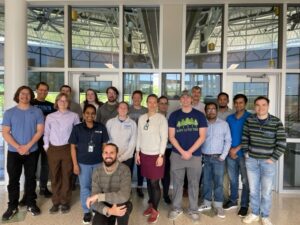Elizabethtown College A.C. Baugher Professor of Chemistry James A. MacKay recently received a research grant from the National Science Foundation (NSF) to continue his collaborative research, “Nucleobase-Modified PNA for Sequence Selective Triple-Helical Recognition of Non-Coding RNA.”
The grant was awarded in conjunction with Eriks Rozners, Professor of Chemistry at Binghamton University in New York, and is the third grant the pair has received related to this project since 2017.
“This collaboration has served to train dozens of Etown undergraduates in the practice of scientific research and has established a bridge between Etown students transitioning from undergraduate studies to graduate studies at a research university,” MacKay said. “Their training sets them up for competitive internships, research opportunities, graduate school preparation, or job opportunities.”
The $825,000 combined grant will continue the multi-year collaboration, which studies new methods for molecular recognition of biologically significant non-coding ribonucleic acid (RNA) and uses chemistry to better understand the role of non-coding RNA in biological processes. The grant will continue until 2027.
While fundamental science is at its core, the project has broader implications for understanding the role of RNA in biological processes, including in pathogens such as SARS-CoV-2, the virus that caused COVID-19.
Rozners and MacKay first met around 30 years ago, when MacKay was a first-year graduate student at the University of Michigan. Rozners was in a postdoctoral position and helped to train MacKay, and in 2015, the pair reconnected and began collaborating.
Since then, more than 20 Blue Jay students have been involved in the research and took the experience with them to their future careers. Many students went on to get their doctorate at institutions across the country, and some pursued medical school or nursing school. Former Etown students formerly involved in the project now hold positions at corporations like Bristol Myers Squibb, the National Institute of Standards and Technology, and FMC Corporation.

A group of Blue Jays and Binghamton University students at the fifth annual Binghamton University/Elizabethtown College RNA Workshop in 2023.
“I was exposed to many concepts and ideas through this research, including an NSF-funded RNA workshop and other collaborative meetings that laid the foundation for my graduate research,” Brandon Tessier ’21, a current doctorate student in organic chemistry at Binghamton University said. “Having the opportunity to collaborate with the next generation of Etown students as a graduate student is something I cherish greatly.”
The RNA workshop occurs yearly when students travel with MacKay to Binghamton University to learn more about the broader implications of the project on a graduate level. This January, 14 undergraduates signed up to attend.
Etown undergraduate students also have had the opportunity to co-author manuscripts as part of the project, and students have given presentations at multiple local, regional, and national meetings.
In addition to the research, NSF funding allows Etown’s Chemistry Department to fund a teaching and research postdoctoral associate, giving Etown students an additional mentor and teacher to draw from. Recently, Dr. Grant Walby completed a successful two-year appointment, teaching six courses over his two years at Etown, and the grant will provide the opportunity for another postdoctoral student to take Walby’s place. MacKay hopes to have the new postdoctoral student start in the summer of 2025.
The grant will also fund two students for each year of the grant to perform summer research through the Summer Creative Arts and Research Program (SCARP), which has taken place annually since 2015.
“Dr. MacKay’s grant has allowed me to explore research projects in depth and learn about many different organic chemistry reactions and techniques,” Jennah Hoke ’25, who worked with Mackay through SCARP in 2023 said. “I’ve also gained valuable speaking skills and writing skills that will help me in my future career.”
The grant will also help to fund MacKay’s upcoming sabbatical, where he plans to do a short stay in Riga, Latvia, in the spring of 2026 working with collaborators on computational techniques used to advance the ideas in his research.
Etown’s in-depth Chemistry major prepares students for a variety of careers and includes foundational and advanced coursework in the five traditional subdisciplines in chemistry: analytical, biochemistry, inorganic, organic, and physical. Discover more.

